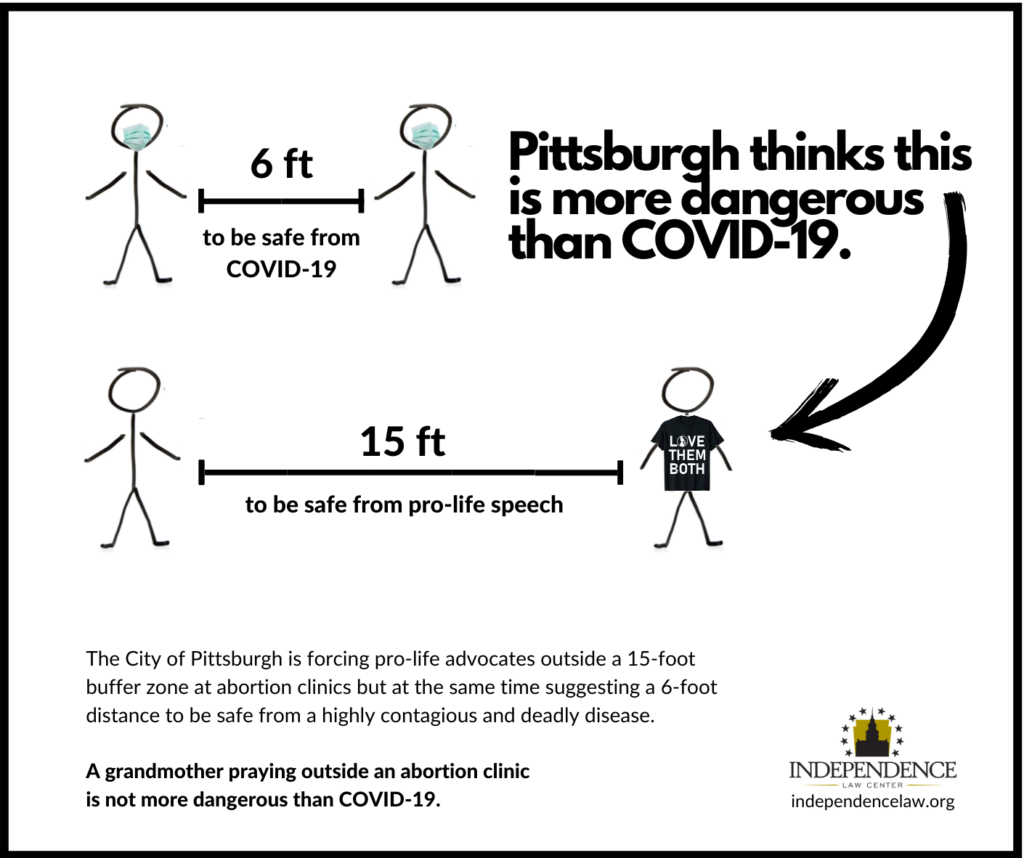By: Jeremy Samek
In Pittsburgh, authorities suggest that keeping a distance of 6 feet from others should help keep one safe from COVID-19, a highly contagious disease. However, the city requires no less than two and a half times that distance to be “safe” from pro-life speech. The 6 feet of separation for COVID-19 is just a suggestion to do “when possible.” But guess what? The 15 foot buffer zone for pro-life speech is enforceable by a city criminal ordinance authorizing fines and imprisonment.
The United States Supreme Court is presently deciding whether it will hear the case of Bruni v. City of Pittsburgh, which was filed by Alliance Defending Freedom and has the potential to fix this affront to First Amendment rights.
Over the years, pro-life sidewalk counselors have had great success in sharing loving options and hope to women entering Pittsburgh abortion clinics. In response, the city decided to restrict this speech in violation of First Amendment free speech guarantees. Think about this: The value of free speech is never higher than when, as is the case here, the intended audience is about to engage in an imminent and irreversible action that they could choose not to take simply by hearing the speaker’s words of hope.
One sidewalk counselor described the compassionate motivation and methods of sidewalk counseling this way:
Women often choose abortion out of fear and a lack of resources. They are told that they aren’t wealthy enough, old enough, young enough, or strong enough or that they will be alone. A sidewalk counselor enters at that moment. With quiet, calm, compassionate words and body language, this person shares what is available to this terrified mother. They share about hope, housing, financial support, community, and a baby shower, and they do this quietly on the sidewalk. If a sidewalk counselor is far away, it is impossible to share this message in the same way.
When the city leaders enacted the ordinance, (Pitts. Code § 623.04), they were clearly aiming to inhibit any pro-life message from being communicated within the 15-foot buffer zone. It has been the city’s understanding and intention that this ordinance prohibits pro-life speech, including that of sidewalk counselors and those handing literature informing the mother of resources available for her and her child. This is true even though speech on other subjects has been permitted in the zone.
Already in place in Pittsburgh are ordinances making it illegal to block entrances and exits. In Pittsburgh, protests are permitted on the public sidewalks right outside of a church building, provided the protesters do not block entrances for those seeking to enter or exit. But in this egregious violation of First Amendment freedoms, and in a demonstration of animus towards pro-life citizens, Pittsburgh forces those advocating for loving options for the mother and child in front of abortion clinic to be a full 15 feet away.
If the city had a problem with sidewalk counselors undermining safety or access (which the evidence showed it did not), it could have employed those existing laws — or if that failed — sought a narrow injunction applicable to persons found guilty of violating laws that prohibit blocking entrances and exits. Instead, the city has used a broadly worded ordinance to achieve its goal of suppressing the First Amendment free speech rights of sidewalk counselors because of the content of their speech — due to its stated goal of “protecting the listen[er] from unwanted communication” outside of abortion clinics.
So if you’re keeping track: if you’re protesting anything else, just be sure not to block the doors. If you’re protesting abortion, you must be 15 feet away. If you’re trying to be safe from a highly contagious disease that caused a strict international shutdown, 6 feet of distance is fine. Who knew that a grandmother praying while wearing a “love them both” t-shirt would be more dangerous than the risk of sharing or contracting COVID-19.
###
Jeremy Samek is Senior Counsel at Independence Law Center, and represents Philadelphia sidewalk counselors in an amicus brief that explains the important Free Speech principles at stake and that asks the Supreme Court to hear the Bruni case.






